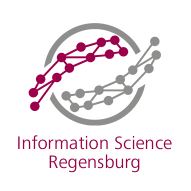
Master Inf Sci
Interested in the Master's Program?

Study Objective
The aim of our master's program is to teach advanced methods of information science. These methods are needed for a subsequent professional activity (self-employed or as employee), e.g. in media business or the software industry - as well as for further qualification in the academic field.
The master's program focuses on the key topics of our research, i.e., it covers the following fields:
- information ethics,
- digital humanities,
- assistance systems,
- knowledge-based systems,
- and natural language engineering.
Thus, our master's program offers the opportunity for research-oriented in-depth study in these areas. The methodological character of information science is made clear by discussing and demonstrating information science issues and methods in changing application contexts.
Module Overview
The consecutive master's program in information science extends over a total of 4 semesters, within which 8 modules must be successfully completed. The program is completed with a final thesis (so-called master's thesis). A total of 120 credits must be successfully completed in the master's program, whereby 1 credit corresponds to approx. 25-30 working hours. The 120 credits are made up of the following achievements:
- At least 90 credits must be acquired by successfully completing the modules provided for in the program.
- 30 credits are awarded for passing the master's thesis.
The credits are awarded in the course of study after successful completion of modules. A module always consists of at least two courses and can usually be completed within 1-2 semesters.
The designation of the modules always consists of an abbreviation for the study program (e.g., "INF" for Information Science), the abbreviation "M" (for "module") and a number (e.g., 30), such as INF-M30.
Information on which courses must be completed in each module and how many credits are awarded upon successful completion of a module can be found in the module descriptions. These also provide a detailed overview of the course content and the qualifications sought in the degree program.
Before applying for the master's program, it is therefore essential to consult the module descriptions in order to match your expectations of the study content with the intended curriculum!
Exemplary Course of Studies
semester | LF | module | credits | total credits |
| 1 winter | VS VS | Digital Humanities (INF-M 30) Natural Language Engineering (INF-M 31) | 12 12 | 24 |
| 2 summer | VS VS P P | Information Ethics (INF-M 32) Knowledge-Based Systems (INF-M 33) Interactive Inf.-& Assistance Systems (INF-M 34) 1. Advanced Module (INF-M 35.1) | 12 12 12
| 36 |
| 3 winter | P P
P | 2. Advanced Module (INF-M 35.2) 3. Advanced Module (INF-M 35.3) (1. - 3. Advanced Module = 20 LP) Project Module (INF-M 36) |
20 20 | 40 |
| 4 summer | S | Master Seminar (INF-M 37.1) Master Thesis (INF-M 37.2) | 2 30 | 32 |
Application
Deadlines
The application deadlines for the consecutive master's program in Information Science are as follows:
- Application deadline for the following winter semester:1st of July
- Application deadline for the following summer semester: 15th of January
Admission Requirements
The prerequisite for admission to the master's program in Information Science is proof of certain subject-specific qualifications. These qualification requirements are specified in the respective master's examination regulations under § 4.
Transition from the Bachelor's to the Master's Program
In order to enable bachelor's students to transition to the master's program without losing time, provisional admission to the master's program is possible.
In order to be provisionally admitted to the master's program, proof of academic achievements from the previous program amounting to 150 credits must be provided, and the admission requirements must be fulfilled. The degree certificate must subsequently be submitted by the end of the 2nd semester. Further information on this can also be found in § 4 of the master's examination regulations.
After receiving a notice of admission to the master's program, you can enroll within the enrollment deadlines.
Application
Please send your application to the chairman of the admission committee for the master's program:
Prof. Dr. Bernd Ludwig
University of Regensburg
Chair of Information Science
D-93040 Regensburg
Please include the following documents in your application:
- Cover letter/motivational letter (optional)
- Curriculum vitae (optional)
- Certificates (certified transcript, if no B.A. certificate yet)
(see also examination regulations for the master's program in Information Science)
Student Advisory Service
Email: Studienberatung.IW@ur.de



